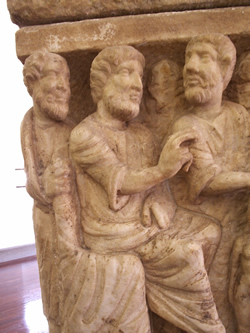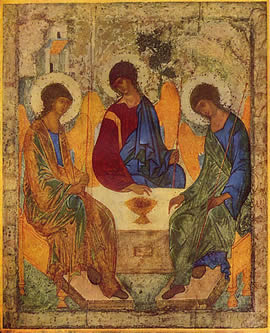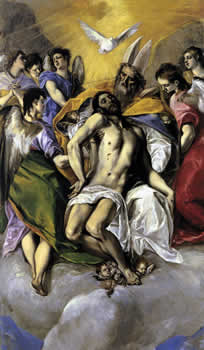For Sunday May 31, 2015
Trinity Sunday
Lectionary Readings (Revised Common Lectionary, Year B)
Isaiah 6:1–8
Psalm 29
Romans 8:12–17
John 3:1–17
Among Western churches, both Protestant and Catholic, the first Sunday after Pentecost is Trinity Sunday. It's a day when we honor the triune nature of the one true God. It's also a day when we can get lost in the worst sort of theological abstractions.
Many liturgies this Sunday will include the sixth-century Athanasian Creed, that "we worship one God in trinity, and trinity in unity; neither confounding the persons; nor dividing the essence." We don't know who wrote the Athanasian Creed, but it makes important affirmations and denials.
Christians affirm the unity and co-equality of the Godhead: we worship not only the Father, but also the Son and the Holy Spirit. We also deny two things, both tritheism — that we worship three gods; and subordinationism — that the Son or the Spirit is subordinate to the Father.
 |
|
Dogmatic Sarcophagus, 350 A.D., Vatican Museum, Rome.
The earliest known depiction of the Trinity. |
But interestingly enough, whereas the Western Church affirms the Athanasian Creed, it has never enjoyed widespread use in Eastern Orthodoxy. This is strange, because Eastern theologians like the "Cappadocian fathers" of the fourth-century — Basil the Great of Caesarea, his brother Gregory of Nyssa, and their friend and bishop of Constantinople Gregory Nazianzus — made major contributions to the doctrine of the Trinity.
When Eastern Orthodox believers celebrate the Trinity, they start in a different place than their western cousins. And it's a good place to start when we worship God. Western theology tends toward intellectual abstraction. Eastern theology emphasizes adoration of the mystery. It has always been wary of the inadequacies of human language, the limitations of the human mind, and the infinity of God.
The desert father and intellectual Evagrios of Pontus (345–399), who spent the last sixteen years of his life among unlettered Coptic peasants in the harsh Egyptian desert, once observed: "God cannot be grasped by the mind. If he could be grasped he would not be God."
Similarly, the Syrian monk and bishop John of Damascus (676–749) wrote in his Exposition of the Christian Faith (I.4): "It is plain, then, that there is a God. But what he is in his essence and nature is absolutely incomprehensible and unknowable. God then is infinite and incomprehensible; and all that is comprehensible about him is his incomprehensibility."
 |
|
Andrei Rublev, Holy Trinity, c. 1400.
|
Both of the Old Testament readings this week emphasize God's transcendence. Isaiah had a vision; the psalmist heard a voice.
Isaiah feared death when he saw the holy God "high and exalted." The seraphs covered their faces, earthquakes shook the foundations, and thick smoke filled the temple. "Woe to me! I am ruined! I am a man of unclean lips, and I live among a people of unclean lips, and my eyes have seen the King, the Lord Almighty."
Psalm 29 mentions "the voice of the Lord" seven times. God's voice thunders over mighty waters, splits the cedars, twists the oaks, and rips the bark off of trees. The psalmist compares God's voice to a bolt of lightning.
All of our thoughts about God and prayers to God live with these limits. A poem by CS Lewis captures the practical implications of God's transcendence. It's called Footnote to All Prayers.
He whom I bow to only knows to whom I bow
When I attempt the ineffable Name, murmuring Thou,
And dream of Pheidian fancies and embrace in heart
Symbols (I know) which cannot be the thing Thou art.
Thus always, taken at their word, all prayers blaspheme
Worshiping with frail images a folk-lore dream,
And all men in their praying, self-deceived, address
The coinage of their own unquiet thoughts, unless
Thou in magnetic mercy to Thyself divert
Our arrows, aimed unskillfully, beyond desert;
And all men are idolaters, crying unheard
To a deaf idol, if Thou take them at their word.
Take not, O Lord, our literal sense. Lord, in thy great
Unbroken speech our limping metaphor translate.
But God's radical transcendence is only part of what we celebrate on Trinity Sunday. God is infinite. But both the gospel and the epistle remind us that he's also intimate and immanent.
Paul contrasts two ways of relating to God. We shouldn't relate to God as a slave who fears a master, but as a child who feels safe with a father: "Abba, Father" (Romans 8:15, Galatians 4:6). "Abba" is the Aramaic word used by Jesus that means something like "Papa." The word is used only three times in the New Testament, and conveys a shocking sense of human intimacy with the divine infinite. It's a word that little children first learning to speak used for their father, and that Jesus himself used to speak to God in Mark 14:36.
During the four years that my family lived in Moscow (1991–1995), we would take the overnight train to St. Petersburg. There, we could visit the magnificent Hermitage Museum, which houses Rembrandt’s "Prodigal Son" (1666). The painting is enormous (262 X 205 cm), and full of deep, dark reds and browns. In it, the stooping father embraces his kneeling son — with compassion, with tenderness, and without any questions about his many failings.
And that's what God is like — a welcoming father.
He's also like a nurturing mother.
 |
|
The Trinity by El Greco, 1577.
|
That's how Paul Young pictures God in his novel "The Shack" (2007). The book was rejected by twenty-six publishers, and so at first Young self-published it. Later it was lampooned by many self-appointed (and self-important) theological gatekeepers. Today there are 10 million copies of "The Shack" in print — a sure sign that the book speaks very powerfully to many readers.
The "shack" is a metaphor for your place of shame, the "icon of your deepest pain," or "the place of your nightmares." In an interview, Young describes the shack as "the place we build to hide all our crap."
The novel begins with a mysterious note from God, who invites Mack, the main character, back to the shack. And so the shack is also a place of healing, for the intimate and tender God always meets us in "the middle of our mess."
What Young has written — and his critics are right about this point — is really a doctrine of God in story form. But it's no Athanasian Creed with technical abstractions. He pictures the trinitarian God who welcomes us back to the shack as El-ousia, "a large beaming African-American woman" (Father), a "small, distinctively Asian woman" named Sarayu who collects tears (the Spirit), and a Middle Eastern man dressed like a laborer (Jesus).
Mack discovers that God isn't like he thought. He's not the product of his projections, or the neat formulas of academic theology. He's perfectly good. He intends to heal and not humiliate us. Mack learns to trust him fully and believe that God is near. That's the good news on Trinity Sunday.
For further reflection:
I like how Bartholomew I, the Ecumenical Patriarch and spiritual leader over all the Eastern Orthodox churches, captures both God's transcendence and immanence in his book Encountering the Mystery (2008): “God as unknowable and yet as profoundly known; God as invisible and yet as personally accessible; God as distant and yet as intensely present. The infinite God thus becomes truly intimate in relating to the world” (186).
Image credits: (1) Wikipedia.org; (2) Artcyclopedia.com; and (3) Lib-Art.com.





